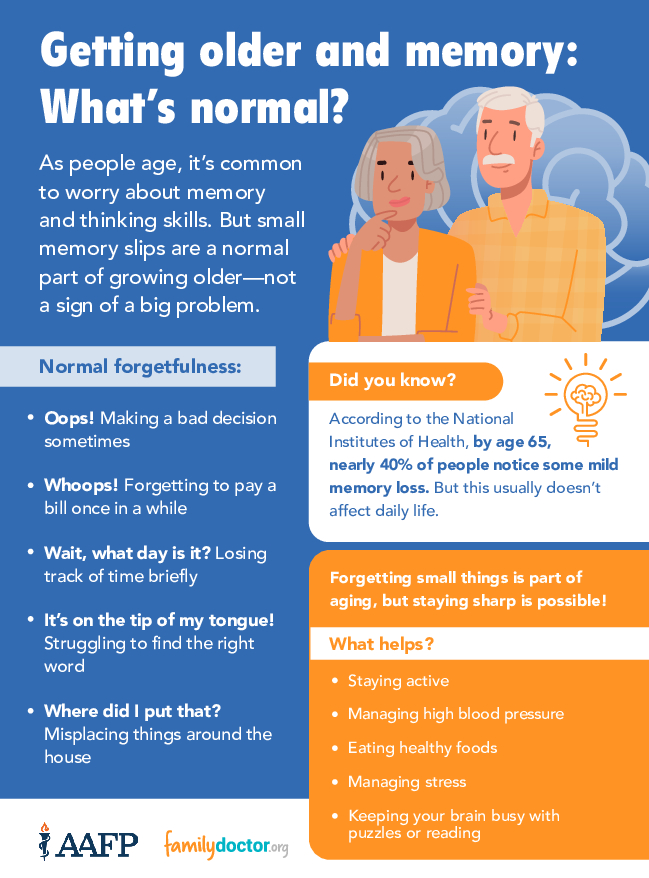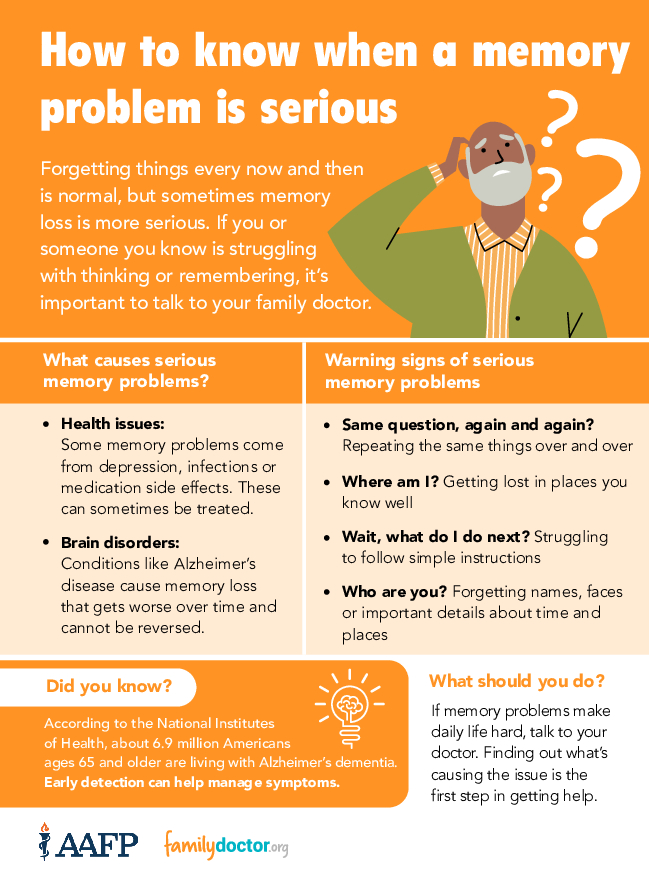Forgetting small things is normal for people of all ages. As we age, this forgetfulness can become more common. According to the National Institutes of Health, nearly four out of 10 people notice mild memory loss by age 65. In addition to mild memory loss, seniors are at an increased risk for developing dementia.
Along with lifestyle changes, like eating a healthy diet and getting regular exercise, brain training can help maintain brain health, even with age. After the age of 65, your risk of developing dementia doubles approximately every five years. Taking proactive steps to care for your brain, including regular “brain workouts” of exercises, games or activities that challenge the brain, can help lower this risk.
Memory and aging
Like other organs, our brains also change with age. As a result, some people may find that they don’t remember or recall information as quickly as they used to. The changes in the brain due to aging can affect things like learning and memory. This is a natural process called cognitive aging or brain aging and it is usually not a sign of a serious memory problem.
What is cognitive aging?
Cognitive aging refers to changes in the ability to think, learn and remember that occur as we age. Cognitive aging is not a disease but a natural part of the aging process. It can have positive and negative effects. While wisdom, experience and knowledge typically increase with age, other abilities, like processing speed, decision-making and some types of memory, may decline.
What is dementia?
Dementia is the progressive loss of memory, language, problem-solving and other thinking abilities that is severe enough to interfere with daily life. Some common signs of dementia include:
- Asking the same question over and over again
- Getting lost in places you know well
- Struggling to follow simple instructions
- Forgetting names, faces or important details about time and places
There are various types of dementia including:
- Alzheimer’s disease (the most common type of dementia)
- Vascular dementia
- Frontotemporal dementia
- Head injury
- Stroke
Dementia symptoms typically get worse over time and are not reversible.
Benefits of brain training for seniors
While you can’t stop your brain from aging, there are steps you can take to keep it sharp and support your cognitive function or ability to understand and function in the world. This kind of “mental exercise” is particularly important for seniors. Brain games, for example, can help seniors stay active and healthy. Even better, brain training and lifestyle changes can help improve cognitive function and positively contribute to mental health.


Memory games and lifestyle changes for seniors
Keeping your mind active and your body healthy are some of the best ways to support brain health. Here are a few ways to get started:
- Follow a healthy diet: Eat a balanced diet high in fruits and veggies, and low in fat. Certain diets, including the Mediterranean diet, may also help reduce the risk of cognitive decline. Also, remember to stay hydrated throughout the day and limit alcohol consumption.
- Be physically active: Engage in aerobic activities like brisk walking, swimming, dancing or bike riding. Aim to move your body for at least 30 minutes each day.
- Stay social: Connecting with others through social activities and community programs can keep your mind active and improve your well-being. This might include scheduling regular phone calls with friends and family, joining a book club or volunteering.
- Challenge your brain: Any purposeful mental exercise can work. For example, you could write a to-do list and then memorize it. Listen to a new song and write down some of the lyrics or draw a map from your home to the library.
- Word puzzles for seniors: Word and number games are a good way of helping seniors’ language skills. Most seniors are familiar with word searches or crosswords. Play Scrabble, solve a puzzle, take an online class or learn a new language to keep your mind sharp.
- Maintain your physical health: Taking care of your physical health supports your cognitive health, too. Stay up to date on your health screenings, manage high blood pressure and other vascular conditions, don’t smoke, aim for seven to eight hours of sleep each night, and make sure to treat any vision or hearing impairment.
When to worry about memory loss
The cognitive changes that happen with age may lead to memory loss. Seniors may experience both short-term and long-term memory loss. These changes can be unsettling, however the mild forgetfulness associated with age-related memory decline is often a normal part of getting older—not a sign of dementia or a serious memory problem.
Signs of mild forgetfulness include:
- Occasionally making a bad decision
- Briefly losing track of time
- Struggling to find the right word
- Misplacing things around the house in normal places
- Not remembering events that happened a long time ago
Serious memory problems make it hard to do everyday things like driving and shopping. If you or a loved one have experienced these signs of serious memory loss, you should contact a doctor:
- Consistently exhibiting poor judgment about everyday life
- Large memory gaps or forgetting where you were
- Significant language misunderstanding or misuse
- Putting everyday items in strange places
- Short-term memory loss about things that just happened
It’s important to talk with a health care provider if you are experiencing noticeable changes in your memory. A doctor can perform tests and assessments to help determine the cause of your memory problems and refer you to a specialist if necessary.
Questions to ask your doctor
- Can lifestyle changes help my memory and protect my brain health?
- How can I tell if my memory problems are due to normal aging or are signs of a more serious problem, like Alzheimer’s disease or dementia?
- Are there any other medical conditions that could be making my symptoms worse?
- Should I be concerned if I perform poorly on brain games or mentally challenging activities? Is that an indication of dementia?
- How can I tell if lifestyle changes are making a difference?
- How many hours a day should I spend playing brain games?
- What does it mean if I get tired after playing games?
- How can I tell if playing brain games is making a difference?
This content was developed in collaboration with the McKnight Brain Research Foundation.
ADVERTISEMENT
ADVERTISEMENT




